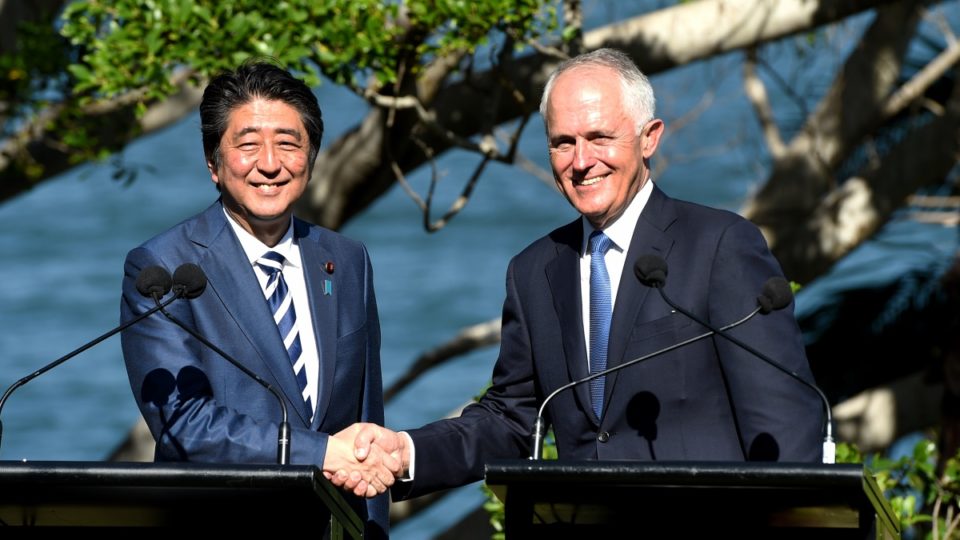Thursday, January 18

TURNBULL’S GREAT LEAP
Australian PM in Japan talking defence; China on agenda.

A defence cooperation agreement will be top of the agenda today as Malcolm Turnbull begins his annual leader’s dialogue with Japanese counterpart Shinzo Abe.
The talks come as Australia’s relationship with China—Australia’s most important trade partner—has hit turbulence after Beijing laid an official complaint with Canberra over comments made by a member of Turnbull’s cabinet criticising China’s aid in the Pacific as building “white elephants” with “roads to nowhere”.
The defence agreement will likely allow the Australian air force to participate in joint exercises in Japan, easier logistics cooperation between the two militaries and for Japanese troops to conduct military exercises in Australia.
Furthermore, Canberra’s National Security College argues China’s hold on Australia’s economy is overblown. Exports account for only 20% of GDP and Beijing only accounts for 30% of all exports. Therefore, Australia has more leeway to adopt more anti-China positions.
Mr Turnbull appears to be calculating that—similar to the response to Australia’s South China Sea position—Beijing will not retaliate to any inked deal with Japan. Expect closer defence cooperation with Japan despite Beijing’s displeasure.
GREAT DOMESTIC PRODUCT
China to release final quarter GDP data from 2017.

The National Bureau of Statistics will publish the 2017 economic growth report in Beijing today. Despite question marks over the accuracy of previous government figures, most neutral observers expect the economy will beat the target of 6.5% annual growth despite an expected final quarter slowdown.
The figures come on the back of solid growth data, including 6.8% in the third quarter, led by infrastructure, domestic real estate and external demand. They also come amid President Xi Jinping’s new economic strategy rollout including massive infrastructure spending abroad and controlling financial lending at home.
Today’s official figures will give Xi confidence to ramp up his reform efforts despite the spectre of extremely high debt. Last month, the IMF warned Beijing of the economy’s dangerous levels of debt. Corporate debt was at 165% of GDP and traditionally low household debt had risen by 15% of GDP in five years.
Going forward Mr Xi will likely continue tightening the rules on domestic lending institutions—particularly cutting the risks in investment markets—to make sure China’s growth is sustainable.
FOOTING THE BILL?
Paris looks across the channel for fairer migrant policy

Today, President Emmanuel Macron will travel to the UK to attend an Anglo-French Summit. There he will meet with Prime Minister Theresa May to discuss defence and migration policy.
Central to the talks will be the Le Touquet accord, an agreement which moved Britain’s border into France in order to control immigration from mainland Europe. Since its inception in 2003, the treaty has resulted in thousands of migrants who are seeking asylum in the UK camping along France’s northern beaches.
Although London has provided $170 million since 2015 to help secure the border, the immigration crisis intensified leaving French officials to feel shortchanged. To help shoulder the financial burden, Macron is now insisting the UK provide further resources.
Although both countries disagree as to the fairness of Le Touquet, walking away could cause a host of humanitarian problems, in addition to degrading already ailing relations. Instead, expect the UK to cough up the funds necessary to keep migrants on France’s side of the channel.


